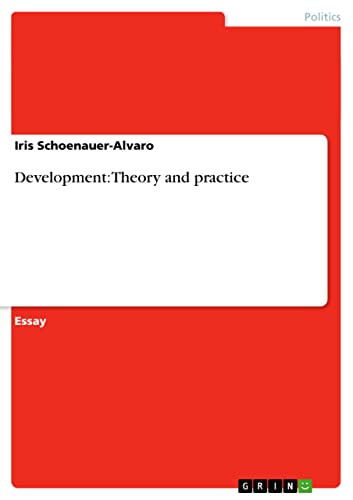Development: Theory and practice - Softcover

"synopsis" may belong to another edition of this title.
- PublisherGRIN Publishing
- Publication date2008
- ISBN 10 3640124979
- ISBN 13 9783640124978
- BindingPaperback
- Number of pages40
Top Search Results from the AbeBooks Marketplace
Development: Theory and practice
Book Description Condition: New. Seller Inventory # I-9783640124978
Development: Theory and practice
Book Description Taschenbuch. Condition: Neu. This item is printed on demand - it takes 3-4 days longer - Neuware -Essay from the year 2003 in the subject Politics - International Politics - Topic: Miscellaneous, grade: Honours, Dublin City University, language: English, abstract: The purpose of this paper is to analyse the development successes and failures of certain countries taking into account whether specific development theories have been applied successfully or not. In order to do so, I will briefly outline the tenets of the main development theories focussing on their constructive aspects without silencing the criticism held against them. Subsequently, I will discuss the different understandings of the term 'development' which will be followed by country-specific analyses of development successes and failures in the light of development theory for which East Asia, Nigeria and Cuba will be used as case studies. Lastly, I will discuss whether reality really proved the predictions of development theory wrong. Generally speaking, the spirit of Peter W. Preston's attitude expressed in his article Development Theory: Learning the Lessons and Moving On1 forges the entire essay.Modernisation theory, the first main development theory of the post-World War II and decolonisation era, clearly reflects Cold War patterns and, as Ronaldo Munck put it, 'was an expression of the then-hegemonic US imperialism' [Kirby: 1997, p. 45]. In the wake of the successful implementation of the Marshall Plan, the rest of the world should also be modernised and, by doing so, convinced to join the capitalist system. The Soviet Union, in turn, applied its 'rubel diplomacy' to support several national liberation movements to get their share of the world. Unfortunately, the idiosyncrasies and special needs of development countries were not taken into consideration. Despite the fact that the modernisation ideas promoted by Durkheim, Weber, Parson, Rostow and McClelland do entail opportunities for general advancement, it is hard to imagine how they should have been compatible with societies predominantly based on a collectively oriented, rural socio-economic structure. Nevertheless, I believe that even today some aspects of this theory could be partly recycled without sacrificing the traditional societal tissue; however, the idea that development can only be guaranteed through industrialisation would need to be discarded. 20 pp. Englisch. Seller Inventory # 9783640124978
Development: Theory and practice
Book Description Taschenbuch. Condition: Neu. Druck auf Anfrage Neuware - Printed after ordering - Essay from the year 2003 in the subject Politics - International Politics - Topic: Miscellaneous, grade: Honours, Dublin City University, language: English, abstract: The purpose of this paper is to analyse the development successes and failures of certain countries taking into account whether specific development theories have been applied successfully or not. In order to do so, I will briefly outline the tenets of the main development theories focussing on their constructive aspects without silencing the criticism held against them. Subsequently, I will discuss the different understandings of the term 'development' which will be followed by country-specific analyses of development successes and failures in the light of development theory for which East Asia, Nigeria and Cuba will be used as case studies. Lastly, I will discuss whether reality really proved the predictions of development theory wrong. Generally speaking, the spirit of Peter W. Preston's attitude expressed in his article Development Theory: Learning the Lessons and Moving On1 forges the entire essay.Modernisation theory, the first main development theory of the post-World War II and decolonisation era, clearly reflects Cold War patterns and, as Ronaldo Munck put it, 'was an expression of the then-hegemonic US imperialism' [Kirby: 1997, p. 45]. In the wake of the successful implementation of the Marshall Plan, the rest of the world should also be modernised and, by doing so, convinced to join the capitalist system. The Soviet Union, in turn, applied its 'rubel diplomacy' to support several national liberation movements to get their share of the world. Unfortunately, the idiosyncrasies and special needs of development countries were not taken into consideration. Despite the fact that the modernisation ideas promoted by Durkheim, Weber, Parson, Rostow and McClelland do entail opportunities for general advancement, it is hard to imagine how they should have been compatible with societies predominantly based on a collectively oriented, rural socio-economic structure. Nevertheless, I believe that even today some aspects of this theory could be partly recycled without sacrificing the traditional societal tissue; however, the idea that development can only be guaranteed through industrialisation would need to be discarded. Seller Inventory # 9783640124978

